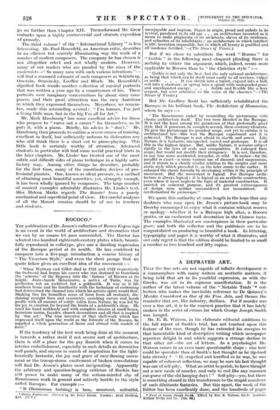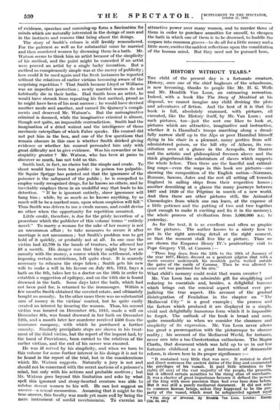A D E PRAVED ART.
THAT the fine arts are not capable of infinite development is a commonplace with many writers on aesthetic matters, it being held that art in its youthful expression, as with the Greeks, was art in its supreme manifestation. It is the author of the latest volume of the " Notable Trials "* col- lection who makes the inevitable reference to De Quincey's Murder Considered as One of the Fine Arts, and thence the reminder that art, like industry, declines. For if murder was ever a fine art, it is to the coarsest practice that it has lately sunken in the series of crimes for which George Joseph Smith was hanged.
Mr. E. R. Watson, in his elaborate editorial additions to the full report of Smith's trial, has not touched upon this feature of the case, though he has extended his energies to that lamentable kind of descriptive writing which newspaper reporters delight in and which suggests a strange decline in that other art—the art of letters. As a psychologist Mr. Watson comes in an even more questionable shape ; else how could he speculate thus of Smith's last thought as he tip-toed into eternity Y " If, stupefied and terrified as he was, he was capable of coherent reflection, we may be sure his last thought was one of self-pity. What an artist to perish, to have thought out a new mode of murder, and only to end like any common cut-purse of the old hanging days ! " Self-pity—yes, but there is something absurd in this transference to the stupid murderer of such dilettante fantasies. But this apart, the work of the Editor has been excellently done, and the hundreds of pages • Trial of George Joseph Smith. Edited by Brie R. Watson, LL.B. London: William Hodge and Co. Roo. 64.3
of evidence, speeches and summing-up form a.fascinatibn for minds which are naturally interested in the doings of men and in the instincts and reasons Unit bring about the doings.
The story of Smith's crimes is still freshly remembered. For the paltriest as well as for substantial sums he married and then murdered women by drowning them in a bath. Mr. Watson seems to think him an artist because of the simplicity of his method, and the point might be conceded if an artist were proved an artist by a single lucky invention. But a method so conspicuously simple was at the mercy of publicity; how could it be used again and the fresh instances be reported without- the relatives of earlier victims becoming aware of the surprising repetition ? That Smith became Lloyd or Williams was an imperfect protection ; newly married women do not habitually die in their baths. Had Smith been an artist, he would have shrunk from repeating his first method, proud as he might have been of his neat success ; he would have devised another mode and another, and earned De Cbrineey's compli- ments and deserved Mr. Watson's. But the unimaginative criminal is doomed, while the imaginative criminal is almost, though not quite, an impossible contradiction. Smith had the imagination of a dried walnut and the intelligence of those mechanic caterpillars of which Fabre speaks. His counsel did not put him in the box, and one of the few questions that remain obscure in this case is whether Smith shirked giving evidence or whether his counsel persuaded him only with great difficulty not to give evidence. Was his cowardice or his stupidity greater Mr. Watson, who has been at pains to discover so rouch, has not told us this.
Smith had, in fact, no choice but the simple and crude. To shoot would have been too public ; to poison too palpable. Sir Squire Sprigge has pointed out that the ignorance of the poisoner is the safeguard of the public ; he is compelled to employ easily recognized drugs, for he knows no others, and he inevitably employs them in an unskilful way that leads to his detection. " If he is ignorant entirely, sheer ignorance will hang him ; while, by as much as he knows anything, by so much will he be a marked man, upon whom suspicion will fall." Thus Smith was driven to use a crude means, and could devise no other when the opportunity for repetition occurred.
Little credit, therefore, is due for the grisly invention of a procedure which the publisher of this volume terms " entirely novel." To marry a woman for the sake of her money is not an uncommon affair ; to take measures to secure it after marriage is not uncommon ; but Smith's problem was to get hold of it quickly, or probably not at all. In one case the victim had £2,700 in the hands of trustees, who allowed her £8 a month.. His danger was that they might buy her an annuity with the money, a course which the settlement, while imposing certain restrictions, left quite clear. It is scarcely necessary to rehearse the steps taken ; Smith gets his new wife to make a will in his favour on July 8th, 1912, buys a bath on the 9th, takes her to a doctor on the 10th in order to establish a suggestion of epilepsy, and on the 13th she is found drowned in the bath. Some days later the bath, which had not been paid for, is returned to the ironmonger. Within a few months Smith obtained the coveted estate, and ultimately bought an annuity. In the other cases there was no substantial sum of money in the victims' control, but he quite easily created an interest by insuring the women. Thus, his second victim was insured on December 4th, 1913, made a will on December 8th, was found drowned in her bath on December 12th, and a month later her murderer received £500 from the insurance company, with which he purchased a further annuity. Similarly precipitate steps are shown in his treat- ment of the third victim, but the report of the inquest had, by the hand of Providence, been carried to the relatives of the earlier victims, and the end of his career was ensured.
He was ill served by his simplicity, and when we turn to this volume for some further interest in his doings it is not to be found in the report of the trial, but in the considerations which Mr. Watson suggests. Naturally a jury is not and should not be concerned with the secret motions of a prisoner's mind, but only with his actions and probable motives ; but Mr. Watson goes beyond this limitation and asks by what spell this ignorant and stony-hearted creature was able to subdue decent women to his will. He can but suggest an answer—a sexual mesmerism. Assuming that it might be the true answer, this faculty was made yet more evil by being the mere instruMent. of sordid .covetaUlnesi.- To exercise an
attractive power over many women, and to murder three of them in order to purchase annuities for oneself, to cheapen the bath in which one of them is to be drowned, to huddle the corpses into common graves—to do all for a little money and a little more, excites the saddest reflections upon the constitution of the human mind. But they need not be pursued here.



































































 Previous page
Previous page